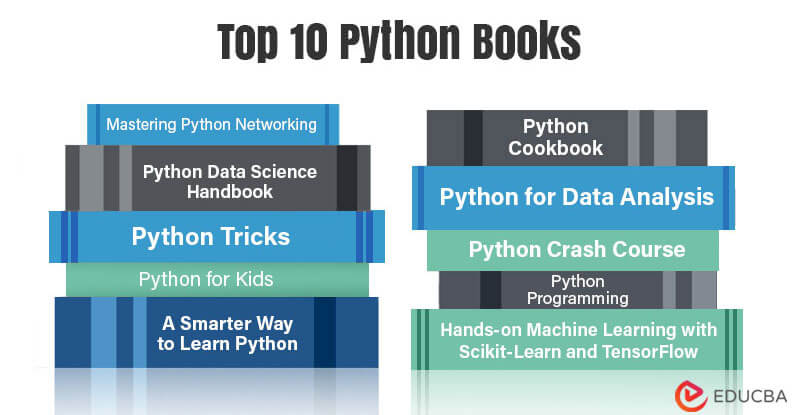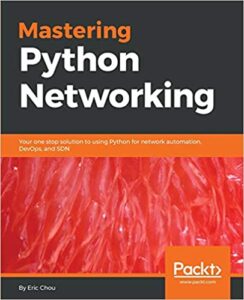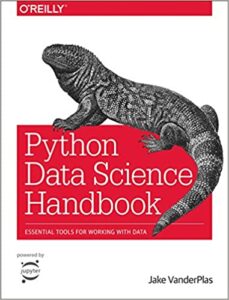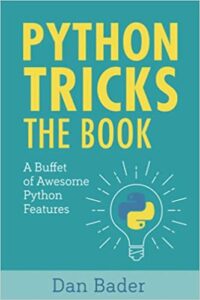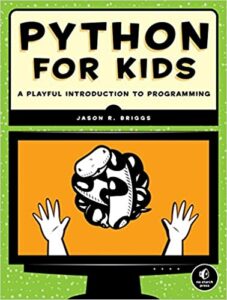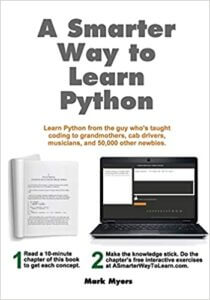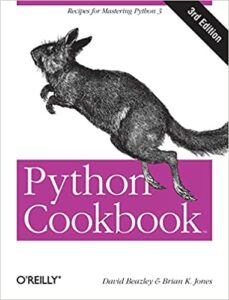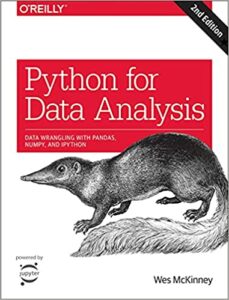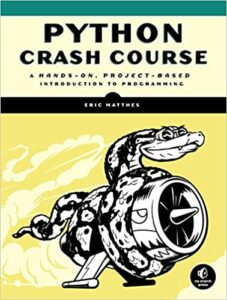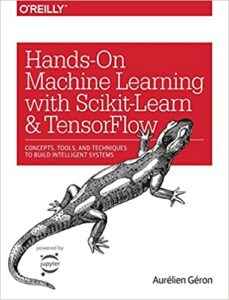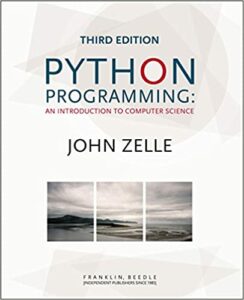Updated December 12, 2023
Python Books to Learn Business
Python is a widespread programming language that is very commonly used for coding nowadays. It is an object-oriented and functional programming language. Learning Python benefits students and developers in the fields of data science, machine learning, and software development. This list of Python books will guide students and professionals in building a strong base in Python. Even kids can start learning from them at an early age. These Python books have explanations and examples to help their readers understand the topics better.
Below is the list of the top 10 Python books that have the latest advancements in Python, data science, and machine learning
| Sr. No. | Books | Author | Published | Rating (out of 5) |
| 1 | Mastering Python Networking | Eric Chou | 2017 | Amazon: 4.3
Goodreads: 3.29 |
| 2 | Python Data Science Handbook | Jake VanderPlas | 2017 | Amazon: 4.6
Goodreads: 4.31 |
| 3 | Python Tricks | Dan Bader | 2017 | Amazon: 4.7
Goodreads: 4.43 |
| 4 | Python for Kids | Jason R. Briggs | 2012 | Amazon: 4.6
Goodreads: 4.17 |
| 5 | A Smarter Way to Learn Python | Mark Myers | 2017 | Amazon: 4.6
Goodreads: 4.36 |
| 6 | Python Cookbook | David Beazley | 2013 | Amazon: 4.6
Goodreads: 4.17 |
| 7 | Python for Data Analysis | William McKinney | 2017 | Amazon: 4.6
Goodreads: 4.15 |
| 8 | Python Crash Course | Eric Matthes | 2015 | Amazon: 4.5
Goodreads: 4.36 |
| 9 | Hands-on Machine Learning with Scikit-Learn and TensorFlow | Aurelien Geron | 2017 | Amazon: 4.5
Goodreads: 4.56 |
| 10 | Python Programming | John Zelle | 2016 | Amazon: 4.6
Goodreads: 4.03 |
Let us now review Python books in detail.
Book #1 Mastering Python Networking
Author: Eric Chou
Purchase this book here
Review:
The contents in this Python Book are in a logical flow, commencing from the basics and ending in the more advanced data. The book has integrated Python automation and networking into a single topic. Readers can understand the procedure of developing a lab environment. Here, they can implement the contents of this book.
Key Points:
- This book comprises the methods to unlock the potential of Python libraries to address tough network problems.
- It is the best choice to learn the method of leveraging Python for SDN, DevOps, and network automation.
- This book is most useful for a Programmer or a Network Engineer who wants to learn Python for networking.
Book #2 Python Data Science Handbook
Author: Jake VanderPlas
Purchase this book here
Review:
This book is an excellent choice if you want to refer to data science and data analytics tasks. The book uses Jupyter, which is very easy to read. Every chapter contains illustrations with well-designed examples. The author seems to have the gift of providing explanations with clarity.
Key Points:
- This book is a great source of various pieces of the data science stack, such as Scikit-Learn, Matplotlib, Pandas, NumPy, and IPython.
- This book is handy for data crunchers and working scientists in Python code.
- The book is a ‘must-have’ for readers who are doing scientific computing in Python.
Book #3 Python Tricks
Author: Dan Bader
Purchase this book here
Review:
This book strikes a perfect balance between real-world solutions and in-depth explanations. The content is lucid and thorough but in an informal manner. The author drives into sufficient details while not over-explaining concepts to the extent that they become slow and frustrating.
Key Points:
- After each section, a brief recap explains the rules of thumb that need to be followed. This serves to remove any uncertainty.
- If you have experience working in other programming languages or you have worked with legacy versions of Python, this book is most suitable for you to come up to speed with modern features and patterns.
- This book reveals the best practices in Python and the potential of the Pythonic code with a step-by-step narrative.
Book #4 Python for Kids
Author: Jason R. Briggs
Purchase this book here
Review:
Children who use this book find programming accessible and enjoyable and begin generating ideas for making games. This book is well-written, has excellent topics, and renders many examples. A good balance exists between support (help and explanations) and challenge (concepts and coding tasks).
Key Points:
- This book is introductory to Python programming and comprises illustrations and kid-friendly examples.
- After reading this book, kids can build a game and create drawings with Turtle, Python’s graphics library.
- This book is a ticket for children aged 10 and more to the amazing sphere of computer programming.
Book #5 A Smarter Way to Learn Python
Author: Mark Myers
Purchase this book here
Review:
This great guide makes Python easy to learn due to digestible chapters, which make you confident to work on projects. After each chapter, there are online quizzes to test readers. This is a great way for a new coder to embark on the Python journey.
Key Points:
- This book uses ‘interactive recall practice’ as the key teaching method.
- Washington University states that this method augments learning performance by 400 percent.
- This book has approximately 1,000 interactive exercises, which are online and free.
Book #6 Python Cookbook
Author: David Beazley
Purchase this book here
Review:
This book is one of the best learning resources to write lean code in Python 3. Learners of this book know how to avoid writing unnecessary long code and falling into traps. It is a fast-paced Python book.
Key Points:
- This book contains practical examples written in Python 3.3, which is suitable for experienced Python programmers searching for content with modern tools.
- The recipes in this book cover an extensive range in scope and difficulty, which begins from simple string concatenation to the creation of BNF recursive parsers.
- This book is the optimum choice if you want to update the Python 2 code or need assistance creating programs in Python 3.
Book #7 Python for Data Analysis
Author: William McKinney
Purchase this book here
Review:
McKinney has clear experience and vision for the pandas’ framework. He has nicely explained the main function and inner workings of NumPy and pandas. This very practical book has many examples, which can be best leveraged by being on the keyboard while reading it.
Key Points:
- This book is a modern introduction that deals with scientific computing in Python, which enables readers to know data-intensive applications.
- It consists of complete instructions to manipulate, process, clean, and crunch datasets in Python.
- Python programmers who are novices in scientific computing and analysts new to Python can use this book.
Book #8 Python Crash Course
Author: Eric Matthes
Purchase this book here
Review:
The structure of this book is such that the difficulty level increases gradually as you proceed forward. Each chapter in the book has exercises at the end, which enable cementing the content. Real Python has chosen this book as one of the best for those who want to learn Python.
Key Points:
- This book introduces Python programming in a thorough, quick-paced manner with the result that you can write programs, solve problems, and make things work in no time.
- This book is ideal for those who want to learn fundamental programming concepts, such as loops, classes, dictionaries, and lists.
- The exercises will ensure that you can write clean and readable code and make programs interactive.
Book #9 Hands-on Machine Learning with Scikit-Learn and TensorFlow
Author: Aurelien Geron
Purchase this book here
Review:
This book teaches readers various tools, the framework you can apply to a specific issue, and the method of thinking about what you want to do in each project. The coding exercises cement your learning and restrict readers from outpacing themselves.
Key Points:
- This book uses two production-ready Python frameworks (TensorFlow and Scikit-Learn) to develop an intuitive understanding of the tools and concepts essential to building intelligent systems.
- You can learn various techniques, from simple linear regression to terminating deep neural networks.
- Even if you know nothing about machine learning, this book helps you leverage simple and efficient tools for program implementation that can learn from data.
Book #10 Python Programming
Author: John Zelle
Purchase this book here
Review:
This book explains tough concepts at a good speed with pertinent examples. It fulfills two aims: introducing readers to computer science and then introducing them to Python as the first programming language.
Key Points:
- The design of this book is such that one can select it as a primary textbook in the first course of computing at the college level.
- This book traditionally teaches the core skills of computer science, emphasizing programming, design, and problem resolution.
- The most crucial modification in this edition is that most of the uses of eval were removed, and a discussion of its dangers was added.
Recommended Books
We hope that this EDUCBA information on “Python Books” benefited you. You can view EDUCBA’s recommended articles for more information.

